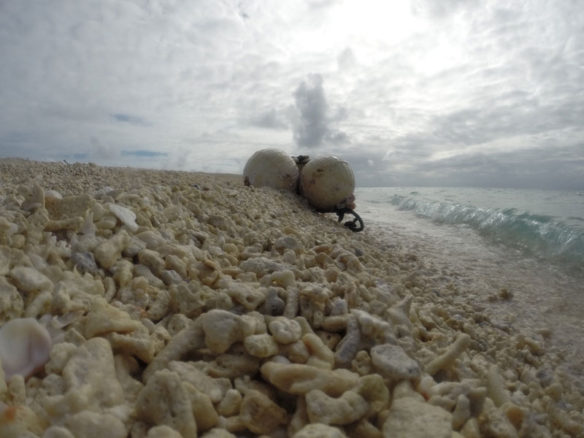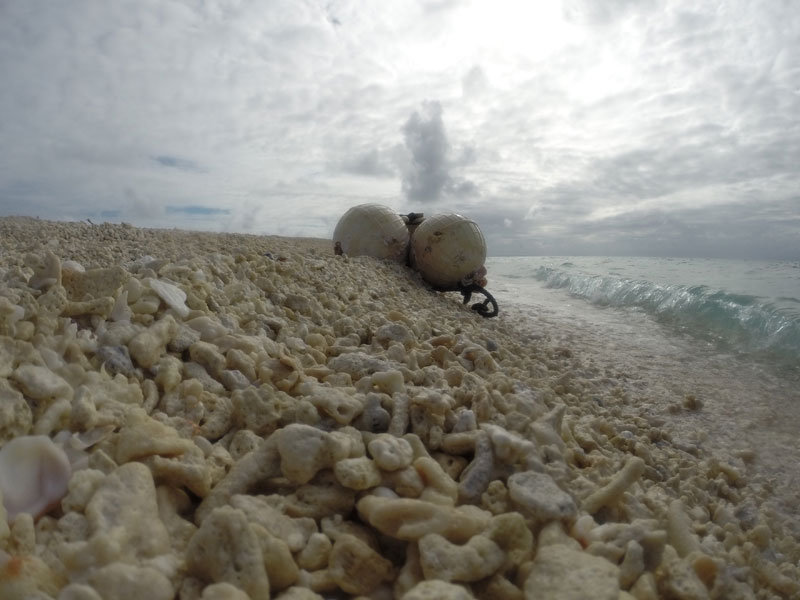
Plastic pollution. Photograph: © SAF — Coastal Care
Excerpts;
In the Port of Amsterdam, a new factory is being built that could revolutionize the way we dispose of plastic waste. Utilizing groundbreaking technology, the facility will use previously unrecyclable plastic to create fuel for diesel powered cargo ships.
The group behind the facility is Bin2Barrel, a Dutch company founded in 2012 by waste management entrepreneurs Floris Geeris and Paul Harkema. While the chemical recycling technology used in the past has worked, Bin2Barrel is the first company to utilize it commercially.
Thanks to a partnership with the Port of Amsterdam and a grant from the Dutch government, the plant is expected to begin operations by the end of 2018. If all goes well, this will be the first of four such ‘plastic to fuel’ factories to be built near the port. In the initial year it’s estimated that 35,000 tonnes of garbage will be converted into 30 million litres of fuel, giving value to materials that would otherwise go to waste.
The project provides a multitude of environmental benefits across the entire value chain. The Port of Amsterdam estimates an annual 57,000 tonnes reduction of CO2 emissions…
Read Full Article, UNEP (07-09-2018)
Ridding the oceans of plastics by turning the waste into valuable fuel; Science Daily (04-03-2017)
Europe Takes First Steps in Electrifying World’s Shipping Fleets; Yale E360 (02-22-2018)
Container ships, tankers, freighters, and cruise liners are a significant source of CO2 emissions and other pollutants. Led by Norway, Europe is beginning to electrify its coastal vessels – but the task of greening the high seas fleet is far more daunting…
Container ships use super-dirty fuel. That needs to change; WIRED (11-09-2017)
About 90 percent of everything we buy will travel on ships like these at some point. And all of these behemoths burn fossil fuel, contributing significantly to the warming atmosphere and shifting climate patterns…
Ship engine emissions adversely affect the health of inhabitants of coastal regions; Science Daily (07-19-2016)
Ship emissions adversely affect the health of inhabitants of coastal regions. This was the main finding of a study on the influence of ship engine emissions on macrophages in the lungs. Since macrophages also play a key role in lung diseases such as COPD, the study is important for understanding the health risks of ship exhausts…
Sea Traffic Pollutes Our Lungs More Than Previously Thought, Science Daily (11-20-2015)
New data show that the air along the coasts is full of hazardous nanoparticles from sea traffic. Almost half of the measured particles stem from sea traffic emissions, while the rest is deemed to be mainly from cars but also industries and natural particles from the sea…
A Satellite’s View of Ship Pollution; NASA (02-07-2013)
“FREIGHTENED – The Real Price of Shipping,” a movie by multi award-winning filmmaker Denis Delestrac-©-2016; (03-31-2016)
90% of the goods we consume in the West are manufactured in far-off lands and brought to us by ship. The cargo shipping industry is a key player in world economy and forms the basis of our very model of modern civilisation; without it, it would be impossible to fulfil the ever-increasing demands of our societies. Yet the functioning and regulations of this business remain largely obscure to many, and its hidden costs affect us all. Due to their size, freight ships no longer fit in traditional city harbours; they have moved out of the public’s eye, behind barriers and check points…
More than 8. 3 billion tons of plastics made: Most has now been discarded; Science Daily (07-19-2017)
Humans have created 8.3 billion metric tons of plastics since large-scale production of the synthetic materials began in the early 1950s, and most of it now resides in landfills or the natural environment, according to a study.
Only 14% of plastics are recycled – can tech innovation tackle the rest? Guardian UK (02-22-2017)
Billions of pounds of plastic waste are littering the world’s oceans. Now, an organic chemist and a sailboat captain report that they are developing a process to reuse certain plastics, transforming them from worthless trash into a valuable diesel fuel with a small mobile reactor that could operate on land or at sea…
Plastic pollution: When The Mermaids Cry: The Great Plastic Tide, Coastal Care
Plastic is versatile, lightweight, flexible, moisture resistant, strong, and relatively inexpensive. Those are the attractive qualities that lead us, around the world, to such a voracious appetite and over-consumption of plastic goods. However, durable and very slow to degrade, plastic materials that are used in the production of so many products all, ultimately, become waste with staying power. Our tremendous attraction to plastic, coupled with an undeniable behavioral propensity of increasingly over-consuming, discarding, littering and thus polluting, has become a combination of lethal nature…









